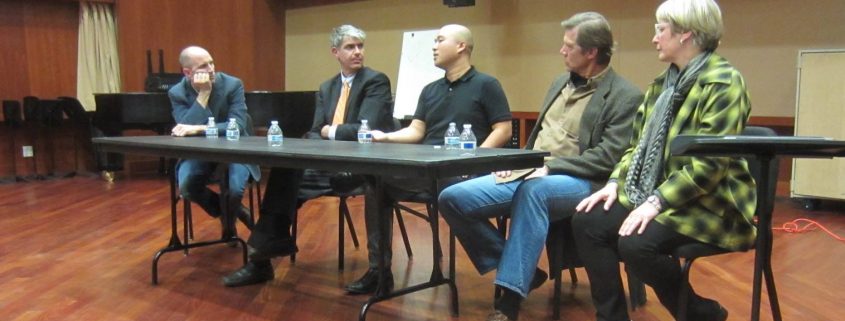Composed reflects on anxiety faced by music performers
Anxiety can be both beneficial and dangerous to a musician’s career. In John Beder’s documentary film Composed, he exposes musicians’ struggle with anxiety and the ways they cope with it. USC Thornton Health and Wellness Committee held a screening of Composed and a live Q&A with Beder alongside multiple USC Thornton School of Music faculty members on Tuesday.
According to the film, 98 percent of concert musicians have experienced and struggled with music performance anxiety. The film reveals how professional musicians grapple with symptoms of anxiety, particularly in auditions, and how it conflicts with their performance.
“We made this film because we are musicians,” Beder said. “I remember, very clearly, being 18 years old trying to play something very soft and quiet on the snare drums and watching as my hands shook violently — to the point where I couldn’t even attempt the excerpt.”
Performance anxiety can be detrimental to a performance, and this disorder caused Rod Gilfry, a concert vocalist and associate professor of vocal arts at Thornton, to lose his job at the Kennedy Center for the Performing Arts.
“I got fired because my anxiety about two of the passages were very high,” Gilfry said. “They kept on coming back to it, and it got worse and worse … and they finally let me go.”
Although performance anxiety is a common condition for musicians, it is often ignored and goes undocumented. The film noted that hypnosis, yoga, meditation, neuroassociative conditioning and mindfulness thinking can help musicians with anxiety symptoms. Lynn Helding, an associate professor of voice and voice pedagogy at Thornton, discussed her research on the subject.
“There really hasn’t been any one or even five things that seem to work,” Helding said. “It’s really up to each person to know themselves and then try different things, and … seek help. The one thing, however, that seems to be the most helpful is when other performers share their stories.”
Beta blockers, a prescription originally given to patients with heart conditions, are a controversial remedy that some musicians turn to as a cure-all and obtain without a prescription. Some musicians are actually prescribed beta blockers, but those who are not can develop an unhealthy dependency that diminishes the authenticity of their performance.
“There is no quick fix,” said Michael Johns, the director of the USC Voice Center. “Seek medical attention for this. There are folks who will help you navigate your issues both in terms of psychological support and even medical therapy.”
In moderation, anxiety can be beneficial and healthy. The film explained the Yerkes-Dodson Law, which illuminates the relationship between anxiety and arousal. Every individual has a specific pocket of anxiety that will bring a peaked arousal, which is beneficial in a musician’s performance.
Whatever level of performance anxiety a performer has, Composed brings light to an issue that many performers fear in their daily life. It brings assurance that no one musician is alone with this condition.
“You see a problem?” Johns said. “Do you have a passion for it? Create the solution. You can do it. There are no barriers around you. There are opportunities for leadership wherever you are in your life journey.”

